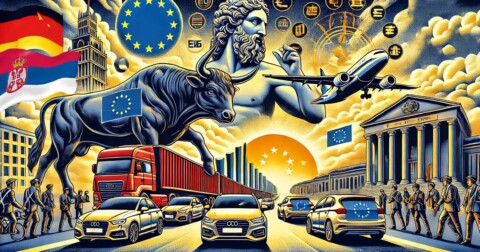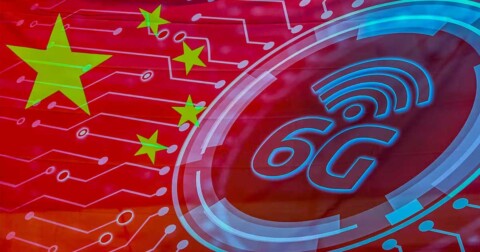It’s no accident that Elon Musk is the world’s wealthiest—and possibly, its most influential—person, wielding unparalleled power over markets, public discourse, politics, and technology. The man’s intellect is equally undeniable, and so far, he has shown himself to have far more empathy for his fellow man than his globalist counterparts. That said, it would be careless to discount that he is an oligarch, a transhumanist, and potentially a techno-feudalist.
SIGNIFICANT IDEOLOGICAL EVOLUTION
Throughout his career, the South African-born billionaire—on track to becoming the world’s first trillionaire—has proven himself to be an astute market strategist, consistently demonstrating remarkable foresight in identifying lucrative market gaps, from the dot-com boom of the late ’90s to the rise of electric vehicles (EVs) and beyond. This is but one of the many qualities that distinguish Musk, and arguably the most pertinent to our present discourse. In recent years, Musk, before the eyes of the world, has undergone a striking ideological evolution. Once a supporter of Biden’s anti-white, radical left-liberal Democratic Party and a proponent of ‘progressive’ approaches to technology, he has evolved to embrace a new Rightist worldview. During the transformation, the eyes of the world looked on as Musk threw the full weight of his support—economic, intellectual, and spiritual—behind Donald J. Trump’s presidential campaign, at great personal cost, while adopting a blend of radical techno-solutionism and a broader conservative, civilizationist vision of reality.
UNLIKE BILL GATES…
Regardless of one’s opinion of him, Musk has an uncanny knack for noticing emerging trends—especially those poorly understood or overlooked altogether by the mainstream. His ability to identify future high-value businesses also naturally extends to political movements, allowing him to anticipate shifts in the political and ideological landscape just as he does in the market.
Hisideological turnaround is rooted in the shared foundations of technological neoliberalism and the new Right, both economically and politically. Far from limiting his businesses to profit-making or solving practical problems, Musk frames his ventures as moral, even messianic missions. Influenced by strands of futurist thought, he advances an expansionist project of space colonization, casting himself as a steward of human civilization’s destiny. In stark contrast with his billionaire peers like Bill Gates, who is fundamentally anti-human, Musk has a vision that calls for rapid population growth—especially among social elites—and the use of rocket technology to transform humanity into an interplanetary species.

AN INSTINCT FOR EMERGENT IDEAS
Musk is the first mega-billionaire to recognize the importance of the ongoing shift of the “Overton window,” break with left-liberal cultural orthodoxy, and capitalize on the moment. Much like his early recognition of Bitcoin’s potential to revolutionize money, technology, and society, Musk understands the profound significance of this radical shift in political and cultural dynamics and its broader implications for the future global order. As such, like any astute businessperson who’s spotted an undervalued asset or emerging market, Musk has positioned himself to “get in at the bottom” of Europe’s alternative right-wing movements. Musk’s elitist and new conservative rhetoric has found resonance within various circles of the global right. Increasingly aligned with these actors, he not only echoes their narratives but also provides them with a powerful platform—especially after his acquisition of Twitter, now rebranded as X. Having strategically positioned himself as a champion of free speech, a cause frequently championed by counter-establishment voices in the US, Musk lifted bans on a litany of high profile accounts previously suspended for violating the platform’s policies on discrimination and abuse.
ON THE FRONTLINE WITH POWERFUL ALLIES
Like any wise leader and shrewd strategic thinker, Musk has not approached the front line of the battle alone but with powerful allies who ha ve been in the counter-globalist struggle themselves for far longer than he has. And Musk, staying true to his inner nerd, did a lot of homework, familiarizing himself and aligning with the key figures, powerbrokers, and decision-makers.
Conservative governments in Europe, such as those led by Viktor Orbán in Hungary and Giorgia Meloni in Italy, have also forged connections with Musk, particularly around their shared pronatalist agendas. Even on the periphery of the new Right—where opposition to both neoliberal economics and techno-solutionism is at times quite fierce—figures like Aleksandr Dugin in Russia and the French New Right’s Éléments magazine have openly expressed support for him.
Given the intense interest in his new political orientation—enthusiastically championed by some while fiercely condemned by others, particularly the left-liberal mainstream he once belonged to—Musk’s shift from one social sphere to another is a natural progression. Moreover, the relentless vilification of the global alternative right by the mainstream media has fostered an inherently hostile social climate, making right-wing circles more inclined to swiftly embrace new allies.
THE NEW RIGHT
New Right political movements, although ascendant, are still, in most cases, in their formative phase and poorly understood—if not outright misunderstood—by large segments of the public. This is simply the inevitable result of a deceitful legacy media establishment that deliberately seeks to mislead or disinform the very people it purports to inform.
And because these political movements—such as those led by Alternative für Deutschland (AfD), Giorgia Meloni’s Fratelli d’Italia (FdI), Reform UK, and similar parties—remain in their nascent stages of development, and sharply contrast with their entrenched, ossified counterparts—the Social Democratic and Christian Democratic parties that have dominated post-WWII continental European politics—they are more fluid and malleable.
This has both its advantages and disadvantages. While this flexibility enables these parties to align with widely popular—yet often taboo—protest sentiments the old regime parties refuse to engage with, and experiment with their rhetoric and policies in order to attract new voters, it also renders them more susceptible to co-option by external interests, whether ideological, financial, or otherwise.
AND CAN HE BE TRUSTED?
Given that the overall orientation, direction, and key policy positions of these parties are not always firmly established—especially regarding foreign policy—numerous powerful, well-funded individuals and organizations, in some cases operating unofficially on behalf of states, have sought to become key players in these political movements in an attempt to steer them in a direction that serves their interests. I imagine few are surprised by this; it is, after all, politics in action. Anyone familiar with the movement can confirm that there is no shortage of such actors.
That said, Elon Musk is merely the latest—and by far the wealthiest, most powerful, and highest-profile—figure to insert himself in Europe’s bourgeoning non-conformist, anti-status- quo political movement. But why has he aligned himself with such political forces—parties like AfD, FdI, and Reform, especially when a) some of their programs run counter to his business interests and b) and when doing so hurts his personal brand and in turn eats into his business profits? What does he hope to achieve or gain? And can he be trusted?
The answer to the first question lies in a mixture of personal grievances against legacy institutions and their supporters—especially the mainstream press—a convergence of business and ideological interests and, perhaps above all, the pursuit of fame, influence, and the power to shape the world according to his vision.

MUSK, THE IDEOLOGICAL MIXOLOGIST
Elon Musk’s “ideology” emerges at the intersection of neoliberalism and technological solutionism. Rooted in the neoliberal belief that elites are society’s primary innovators and value-creators, Musk has carefully cultivated a public image as an eccentric, misunderstood genius. He presents himself as the quintessential self-made entrepreneur—someone whose success stems from raw talent, relentless work ethic, and a deep commitment to advancing humanity. Though he’s often portrayed as a nonconformist, Musk’s narrative suggests he is more focused on the future of civilization than on personal gain.
Yet this carefully crafted persona is largely Musk’s creation. Despite his claims of standing apart from Silicon Valley’s dominant ideologies, he mirrors other prominent tech moguls in both his methods and beliefs.
Musk’s business empire—including Tesla, SpaceX, and SolarCity—has long relied on substantial government support. By 2015, his companies had benefited from an estimated $4.9 billion in federal subsidies, either to stave off bankruptcy or to sustain his start-up model—a common practice between the US government and Silicon Valley. Far from being the “ordinary person” he presents himself as, Musk hails from a wealthy South African family, underscoring the gap between his self-made narrative and his privileged background.
A MISSION ENTRUSTED TO THE ELITE
Musk’s flagship companies all claim to serve lofty goals—improving human life and expanding its horizons through technology. Yet these missions often mask his private interests and align closely with Washington’s strategic aims. Besides, at its heart, Neuralink embodies transhumanism—the belief that humans can and should transcend biological limits through technology.
This ideology isn’t without cracks. Transhumanism assumes we should transcend nature, but who decides the endpoint? Ethicists question consent and privacy—your brain data in Musk’s hands?—while critics like Steve Bannon[1] see it as elitist tinkering, divorced from “real” human struggles.
In recent years, Elon Musk has intertwined his brand of neoliberal techno-solutionism with a blend of futurist, elitist, and climate-change-dismissive ideologies. Central to this is his endorsement of longtermism—a philosophy he calls “a close match for my philosophy”—which prioritizes the long-term future of humanity over immediate welfare. Longtermism, rooted in utilitarian thought, tasks elites with identifying and maximizing value for future generations, even at the expense of present-day concerns. It echoes the Austrian school of economics’ belief in the unique role of elites as visionary decision-makers.
MARS, LIKE THE AMERICAS CENTURIES AGO
This ideological framework seamlessly aligns with Silicon Valley’s late-stage capitalism. It reinforces the notion that global challenges can be solved not through public policy or democratic governance—seen as obstacles to technological progress—but through private initiatives led by a small oligarchic elite.
The pursuit of technological expansion—on Earth and beyond—is another cornerstone of this ideology. For Musk and effective altruists alike, human destiny hinges on transitioning from a terrestrial to a galactic species. Musk’s plans for Mars colonization through SpaceX are framed not only as scientific progress but as a moral imperative to “make life multi-planetary.” This rhetoric echoes US space policy, which has seen continuity from Trump to Biden, with both administrations supporting lunar and Martian settlement. Mary-Jane Rubenstein highlights how Trump’s vision of “America’s manifest destiny in the stars” mirrors the colonial logic of past conquests—where Mars, like the Americas centuries ago, becomes a frontier promising prosperity, salvation, and freedom.
WINNING THE CULTURE WINS THE WAR
Elon Musk has faced significant financial and reputational losses due to his vocal support of right-wing figures and causes. Several major companies have pulled their advertisements from X (formerly Twitter), and there has been a noticeable dip in Tesla’s stock value — a direct result of the backlash against Musk’s increasingly polarizing political stance. Yet, despite these setbacks, Musk’s trajectory has become a case study for other right-wing businessmen who are grappling with their role in shaping cultural narratives.
Historically, the left has been far more adept at understanding and leveraging the concept of cultural hegemony — the idea that true power lies not just in winning elections but in controlling the institutions that shape public consciousness: the media, education, arts, and popular culture. Figures like George Soros have famously invested billions into nurturing a cultural ecosystem that aligns with progressive values, funding everything from journalism grants to artistic awards to academic programs. The left grasps that long-term societal change depends on dominating the cultural conversation — a strategy that requires both vision and substantial financial backing.
In contrast, the right has traditionally placed its faith in the “free market of ideas,” assuming that if their perspectives have merit, they will organically rise to prominence without the need for strategic investment. But as Musk’s example illustrates, this approach often leaves right-wing voices isolated and vulnerable to economic pushback.
SOROS UNDERSTOOD A LOT OF THINGS
Thierry Baudet captured this divide in a recent post:
“Soros understood a lot of things: let’s not underestimate our opponents. He and his allies continuously outplay us — we’re always losing — but we fail to learn. The crucial insight the left and their globalist partners grasp is that real power in a democracy doesn’t come solely from winning elections. Societal change doesn’t happen just by forming a government. The true power to transform society lies in the institutions that define cultural hegemony — the newspapers, the literary prizes, the schools and universities, the films and documentaries, the writers and artists. Politics, and the changes it brings, flow downstream from culture.
“The right often clings to the belief that the free market of ideas will naturally balance this. That books, movies, and academic works should stand or fall on their own, with their creators living off sales and public support, not subsidies. But as DOGE is showing the world: the left heavily funds its ideological champions. There’s no level playing field. Without comparable financial support, a thriving right-wing cultural ecosystem will never materialize,” says Baudet.
Musk’s experience — losing billions yet refusing to retreat — underscores this tension. It highlights the cost of challenging established cultural powers without coordinated financial and strategic backing. For the right to break through, it may need to rethink its relationship with cultural investment — understanding, as the left has for decades, that money doesn’t just win elections; it shapes the very world in which those elections take place.





